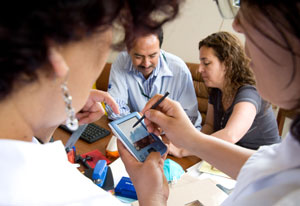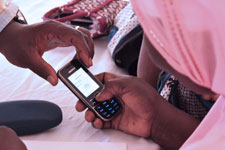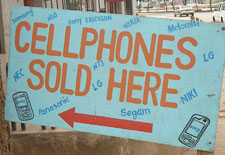Mobile health research agenda continues to evolve
January / February 2012 | Volume 11, Issue 1

Photo by David Snyder for Fogarty/NIH
Scientists are integrating mHealth applications into their global
health studies but continue to grapple with issues such as
interoperability, gender balance and the need for evidence to
guide decision making.
Novel uses of mobile communications devices and applications continue to spur rapid advances in global health research but also raise a number of concerns. Gender balance, interoperability, sustainability and the role of evidence in program designs were some of the issues discussed at the 2011 mHealth Summit. The third annual meeting in Washington drew more than 3,000 policymakers, scientists, clinicians, mobile communications experts and business executives from 48 countries. The Foundation for NIH organized the event, which brought attendees together to discuss findings, share insights and debate the future direction of the rapidly growing field.
Public-private partnerships play a key role, according to HHS Secretary Kathleen Sebelius, who emphasized the importance of federal science agencies as a catalyst for mobile health innovations. "Government couldn't and shouldn't replace private industry as the primary force for developing new products," she said. "But government can play a critical role; we can play a role in providing the research, and driving the research that helps with the content of the new technology." Sebelius cited the proliferation of health applications designed for smartphones and recent initiatives supported by HHS such as Text4baby and SmokefreeTXT, a new intervention targeting teen smokers and shaped by a growing body of evidence regarding phone-based smoking cessation.
International health issues were at the forefront of the summit. Dr. Patricia Mechael, who recently became executive director of the mHealth Alliance, summarized some of the improvements that mobile health technology has brought to the world's poorest and most vulnerable populations. "This is having an extraordinary global impact, with early evidence that mHealth is leading to improved case management of malaria in Kenya and increased access to information for pregnant women in countries like Ghana and Bangladesh," she said.
Mechael also laid out the mHealth Alliance's new strategy, emphasizing the organization's priorities of building an evidence base, increasing technology integration, promoting sustainable sources of financing, developing policies supporting mobile health and cultivating a health community with the ability to design and deploy the technologies. She also made it clear that much work remains to be done. "The mHealth field is quite fragmented and siloed, which can make our goal challenging," she said. "You have a lot of implementations, but there isn't a real structure or strategic alignment of technology to what people are trying to address in terms of the major health challenges."

Photo courtesy of Dr. Marc Mitchell
While many women in developing countries
are responsible for their family's health, they
do not always have access to cellphones.
Tackling gender issues in low- and middle-income countries (LMICs) was one of the dominant themes at the conference. Though cellphones are widely used in much of the developing world, in some countries they're unavailable to women. One reason is that male heads of households often control the phones, according to Dr. Ananya Raihan, an information and communications technology expert who is currently implementing a cellphone-based service for new and expectant mothers. Raihan shared insights gained from working in Bangladesh, a country with 100 percent mobile network coverage. "Most of the families have access to mobile phones. Unfortunately, only 38 percent of women have access to a personal mobile phone," he said.
Several experts stressed the necessity of sustainable designs for low- and middle-income countries, along with the need for programs that feature interoperability between different types of information and communications technologies. "The mobile platforms that are used in developed countries are not necessarily the way to collect information in developing countries," said Dr. Sanjoy Paul, Accenture's country director for India. He used a personal example of buying a powerful Samsung tablet in New York, only to realize the device was useless when he moved outside of the United States. "Why?" he said. "Because there's no connectivity, and if there's no connectivity, I can't do anything at all." Paul recommended that health experts working in developing countries "push intelligence to the mobile" and maximize the processing power and storage capacity of the phones instead of relying on a server connection.

Photo courtesy of Frontline SMS
Another popular topic was the need for evidence-based designs. "A clinical decision support system is as good as the data on which the system is built," Paul said. "The richer the data, the more effective the clinical decision support system is."
Similarly, Dr. Wendy Nilsen, a behavioral science expert at NIH, emphasized the importance of carrying out evaluation measures such as randomized clinical trials once a mobile health platform is developed. "They help you figure out am I doing the thing that works? Am I doing the thing that is safe? Is it better than what is out there?" she said. "This is what evaluation does. It really is how we make sure things are working well." Nilsen also discussed the difference in time scales between technology developers and health researchers, a "cultural divide" that can affect the integration of study findings into an application.
In spite of these concerns, many attendees were enthusiastic about the future, particularly regarding potential collaborations. The mHealth Alliance's Mechael echoed this optimism in her closing remarks. "mHhealth can have a positive impact on each and every one of us," she said. "It is in all of our interests to come together to learn and support each other's work, so that we and our constituents can all harness the power of mobile for better health."
More Information
To view Adobe PDF files,
download current, free accessible plug-ins from Adobe's website.